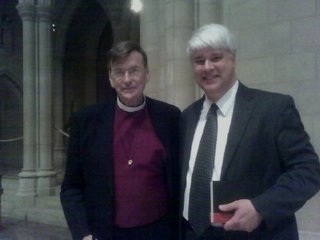
The once-a-decade gathering of nearly 800 bishops of the Anglican Communion, the Lambeth Conference, is only about eight weeks away, and I've been thinking for many days now about how the global Anglican family will look at the end of the 14-day event. The picture I've chosen to include with today's post, a photo of several of the bishops in attendance at the 1998 conference, displays a great deal of warmth and good humor that I feel is going to be missing this year.
The biggest cause for concern for many, as I've touched on in a few posts over the past few years, is the 2003 election of Gene Robinson as bishop of the Episcopal Diocese of New Hampshire (an election I supported of a priest that I support). Before that had even completely sunk in on folks, the Episcopal Church elected Katharine Jefferts Schori as the first female presiding bishop (another election and another priest I support). I've been very proud of the church for some of the actions it has taken in recent years, and in the process have discovered that have a much more moderate-to-liberal view of events in the ECUSA than I had ever realized -- something that I think would have shocked my late friend Sheldon Vanauaken, who once told me in a letter that had Jack Spong (another bishop who has opened my eyes to a lot in the church) been Catholic, he would have excommunicated. No telling what he would think of my opinion on recent events!
In looking at the
official website for the Lambeth Conference, I was immediately struck by the opening paragraph on the main page: "The Lambeth Conference is one of the global Anglican Communion's Instruments of Communion. It takes place every ten years at the invitation of the Archbishop of Canterbury. It is the one occasion when all bishops can meet for worship, study and conversation. Archbishops, diocesan, assistant and suffragan bishops are invited." The implication here is that the Archbishop invites ALL bishops to attend every ten years for a variety of educational and spiritual events -- and yet this year, he has opted to dis-invite Gene because of the ongoing controversy resulting from his election. What he didn't do, however, is dis-invite anyone else involved in the dispute -- such as Archbishop Peter Akinola, head of the diocese that many of the breakaway parishes here in the U.S. have joined -- and will stand by and watch instead as Akinola and a group of other bishops stage a boycott of the conference.
So let's recap: Rowan Williams would rather keep one duly elected member of the House of Bishops away from a conference that by all rights associated with his position he should be able to attend, so that he can avoid a larger protest by a group of fringe bishops who are going to be boycotting Lambeth whether Gene is there or not.
And the logic in this would be where?
As I've heard Desmond Tutu say many times (and I've paraphrased here), it's astounding that the church has so completely lost sight of its mission in the world and is more concerned about who is living with who rather than who is feeding the poor, sheltering the homeless, clothing the naked, and loving those who feel unloved and neglected. And in addition to all of this, what really pains me is the fact that I can no longer drive by some of the grand old parishes here in Northern Virginia and see what I used to see -- old, historic roots of the churh in this country; instead, I look at places like the Falls Church and only see a brick building that, instead of a church, is now merely an object in a court battle, and what was once a home to a great congregation that has now been torn apart at the seams.
In the all the reading I've done over the past several years as things within the Anglican Communion have gotten rockier, it seems that I've found that people are letting the media drive the story and overplay that we are all losing sight of the big goal of trying to keep the communion together. No, I'm not saying that folks are avoiding the issue; I know there are countless people who pray daily that a resolution can be found so that the church can be held together, or short of that at least be healed. Court battles, amicus briefs, and the "join this diocese -- our bishop isn't an abomination" statements are everywhere, and all I seem to see Rowan doing is trying to keep the extreme ends of the argument happy (or is the correct word pacified?) without paying much attention at all to what the middle wants: peace and unity.
Peace and unity -- two words that I fear won't be the end result of this conference. Gene will still be in England, preaching and lecturing in whatever churches welcome him; Spong and Tutu will be at Lambeth, fighting the good fight and working with their brother and sister bishops to keep the communion together.
And in the meantime, I'll continue driving by a church building that should be a welcoming sight, but right now comes more and more to represent intolerance, fear, and a judgemental attitude towards a group -- a bishop -- that they refuse to accept. I suppose the next step will be removing the sign that says "The Episcopal Church welcomes you;" for many, "
This Episcopal Church
may welcome
some of you" is much more accurate.
Lambeth may end with a photograph of smiling bishops -- but will God be smiling?

